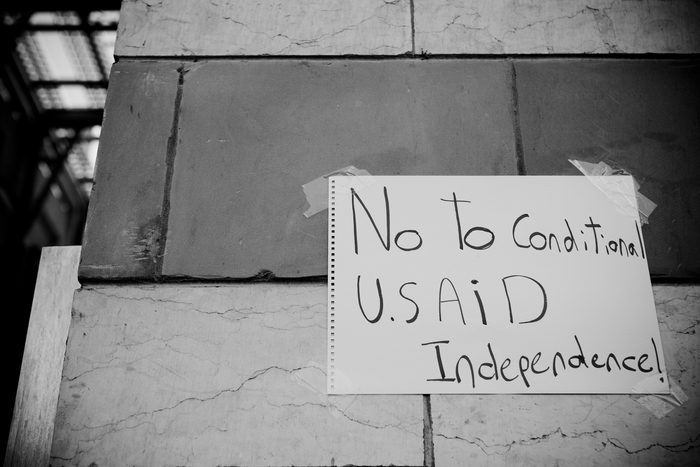
Non-Egyptian activists and policy wonks are too heavily focused on the electoral politics of the Islamist Freedom and Justice and Nour parties. Many are still trying to come to terms with the fact that the Arab awakening has indeed elevated a variety of voices, some of which are less appealing to Western audiences than others. But in addition to energizing the political arena, the Arab awakening has had an equally significant, but less visible consequence: reactivating Egyptian civil society. Egyptian activists and public policy advocates attest to how the uprising has provided a much-needed jolt for civil society organizations that were dormant for much of Mubarak’s thirty-one year reign. In a new burst of activism, Egypt’s estimated 24,500 civil society groups are currently working to reframe the “how” and what of civic engagement by drafting new legislation like the Freedom of Information Act (FOIA) with assistance from the Egyptian American Rule of Law Association (EARLA). If enacted, this vital new law will ensure the free flow of information between media and the newly formed government, an essential feature of the democracy Egypt aspires to become. As Egypt’s transition continues to unfold, watchdog institutions have an important role to play in advancing transparency and freedom of expression.
Given EARLA’s support for legislation protecting freedom of information, some were confused by the association’s decision to withhold the names of Egyptian civil society organizations with which it works. The decision to withhold this information was meant to shield Egyptian organizations from a harsh legal and regulatory environment, which a study by Peter Gubser has described as “one of the most restrictive in the world.”
Recently, the interim government has taken several steps to intimidate and increase oversight over Egyptian NGOs, including threats of prosecution for groups that receive allegedly illegal funding from the United States and other foreign donors. The severity of the government’s crackdown on NGO activity became apparent in August, when the Cairo Institute for Human Rights Studies, along with 35 other Egyptian human-rights organizations, issued a complaint to the UN High Commissioner for Human Rights condemning the military’s campaign of harassment targeting civil society activists and organizations. On September 14, the cabinet announced that the Justice Ministry would begin investigating 30 NGOs accused of “treason” for receiving foreign funding without being registered with the Social Solidarity Ministry as required by the Law on Associations and Foundations (Law 84 of 2002). On November 16th, the Justice Ministry shared its investigative commission findings and claimed that Qatar, Kuwait, and the U.S. have been attempting to influence the outcome of elections by pumping foreign funds to Egyptian civil society groups. Meanwhile, the state-owned newspaper Al-Akhbar, claimed that local Salafi groups are receiving millions in donations from religious foundations in the Gulf states.
As if the current legal framework weren’t restrictive enough, the Ministry of Social Solidarity is now working to tighten regulations on foreign assistance for Egyptian NGOs, reportedly preparing amendments to the Law on Associations and Foundations (Law 84 of 2002) that will “tackle loopholes” used by Egyptian NGOs “to obtain foreign funding to serve foreign interests.” In mid-November, Egyptian banks were instructed to report back to the government on the assets and financial transactions of 28 NGOs. Given this pattern of harassment and intimidation, EARLA’s decision to withhold the names of its Egyptian partners seems like a necessary precaution.
While EARLA’s refusal to disclose the names may seem hypocritical in light of the association’s support for freedom of information, in this case safety trumps transparency. Authoritarian governments have often justified censorship and lack of transparency as necessary measures to protect national security interests. When governments control and restrict information, the result is to consolidate the regime’s power and constrain civil society. But when civil society actors themselves work to control and manage the flow of information, the dynamic is reversed, and watchdog organizations can actually gain power relative to the government by protecting themselves from undue surveillance and interference. Withholding information from the bottom up can have the effect of empowering civil society, which was one of the fundamental goals of the Arab Awakening in Tahrir Square, Alexandria and beyond.
Yes, it is somewhat ironic that a non-profit group that advocates transparency does not publicize the names of its Egyptian partners. But far greater hypocrisies have left their mark on Egypt’s transition, with much more serious consequences. For example, the United States expressed support for the Egyptian uprising while at the same time allowing the export of U.S-manufactured teargas to the Egyptian government, which unleashed these chemicals on peaceful protesters. We have seen what the Egyptian government is capable of doing to its own people. Until the new constitution and other protective legislation is enacted, the confidentiality of Egyptian NGOs must sometimes be preserved to guarantee a safe space for civic activism.
Mehrunisa Qayyum is a freelance international development consultant and editor of PitaPolicy, a blog focusing on the political economy of the Middle East and North Africa.
Photo Credit: 3Arabawy
Image: a1297_36107_yWOLzF_700.jpg
